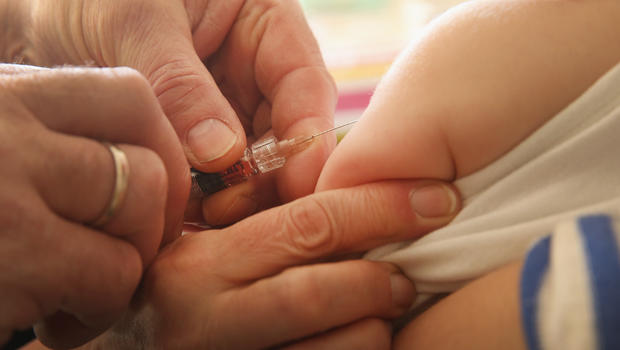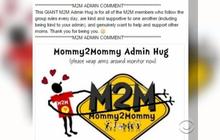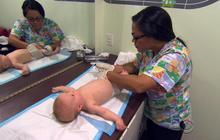Two Georgia Parents Let Their Infant Starve to Death In Large Part Due To Their Religious Beliefs
August 29, 2016 by 64 Comments
The father, Herbert “George” Landell, was found guilty of second-degree murder this morning. He’ll likely be locked away, too.

… Landell, 26, a now-former Publix supermarket worker, isn’t a believer in doctors or medicine and held to the theory that evil took his little girl’s life, according to Hamrick.
On her last day, March 25, he told police he found her in trouble, her skin turned grey and blue. He said he lifted her from the crib and tried to give her a bottle. He told his wife, 25-year-old Lauren Fristed, to leave the room because of her “negative energy,” and he prayed, [detective Charles] Hamrick said.Even if he didn’t want to take the baby to the doctor, couldn’t the mother override his wishes? No. Because the Bible told her not to.
On the day the girl died, Fristed sent a text to her “spiritual adviser,” a minister of non-denominational Christianity in Lawrenceville, saying, “I wish he would let us go get her seen about,” the detective said.
Faith prevented her from pressing it.
“She told me on several occasions that she obeys her husband,” Hamrick said, “that that’s what the Bible says.”
Just horrible parenting guided by horrible faith.
If there’s any silver lining here, it’s that Georgia doesn’t allow religious exemptions from the law when it comes to murdering your child. (Believe it or not, other states do.) That’s why both parents are getting the harsh punishments they deserve.
If only they had the common sense to take their daughter to a doctor instead of listening to the voices in their head and church.
http://www.cbsnews.com/news/more-parents-believe-vaccines-are-unnecessary/
More parents believe vaccines are unnecessary

File photo of a child being vaccinated against measles, mumps, rubella and chicken pox.
Sean Gallup, Getty Images
Pediatricians are encountering more parents who refuse to have their children vaccinated, mainly because they don’t see the point of vaccines, a U.S. survey found.
In the survey, conducted in 2013, about 87 percent of pediatricians said they had encountered vaccine refusals, an increase from the 75 percent who reported refusals during the last survey from 2006.
The most common reason, provided by three out of every four parents: Vaccines are unnecessary because the diseases they prevent have been wiped out in the United States.
“Because these diseases are gone, people no longer fear them, even though many of them are only a plane ride away,” said Dr. Kathryn Edwards, co-author of a new American Academy of Pediatrics report based on the survey. “They don’t seem to realize that these diseases do exist in other places, and could come here.”
The percentage of pediatricians who always dismiss patients over repeated vaccine refusals has also increased, doubling from 6 percent in 2006 to 12 percent in 2013, the survey found.
In the report, the AAP urges pediatricians to exercise patience with worried parents rather than closing their doors to them.
“Our goal is to work with our patients so they understand the importance of vaccinations, and their questions about vaccines are answered,” said Edwards, a member of the AAP Committee on Infectious Diseases.
The reasons parents provide for refusing vaccines have evolved in recent years, pediatricians report.
In 2006, about three of every four parents who refused vaccines said they were worried that vaccines could cause autism -- a theory that’s been debunked -- or produce serious side effects.
Fewer parents gave those as reasons in 2013, although many still cite concerns about safety. Concerns over a baby being too small to receive vaccines, or discomfort at having too many shots at once, have also diminished, the survey found.
Instead, most parents are refusing childhood vaccinations because they see vaccines as unnecessary, and that number increased by 10 percent between the two surveys.
The new survey results are published online Aug. 29 in the journal Pediatrics.
Thanks to the protection provided by vaccines, parents haven’t seen the ravages that can be wrought on children by diseases like chicken pox, measles, meningitis and polio, said Dr. Claire McCarthy, an assistant professor at Harvard Medical School in Boston.
“We are so good at what we do with vaccines that the danger of vaccine-preventable illness can seem not quite real to this generation of parents, and that’s definitely getting in the way,” McCarthy said.
Pediatricians need to confront this belief, Edwards and McCarthy agreed.
“This is very frightening to us as pediatricians because in this global world, their child absolutely could get polio,” McCarthy said. “Polio is endemic in many parts of the world, and all we need is for one of those people to come on over to the United States and hang out in a shopping mall or Disney World.”
The report urges pediatricians to:
Doctors also can present tales of tragedy from their own experience, she added.
“Many years ago, I watched a baby die of meningitis that I couldn’t rescue,” Edwards said. “Now that’s gone, because everybody gets meningitis vaccine. That’s the power of vaccine. It’s enormous.”
Pediatricians also should remind parents that vaccination is something of a civic duty. If large numbers of parents refuse vaccines, the herd immunity that occurs with widespread vaccination can be compromised, McCarthy said.
“Vaccination is not just about you and your kid,” she said. “It’s about your neighbor’s newborn. It’s about your grandmother. It’s about the kid at school who can’t receive a vaccine because he’s on chemotherapy.”
The 2015 Disneyland measles outbreak provides another good example pediatricians can cite, McCarthy said.
“I can say, ‘Look, this is real, your child could get measles,’” she said.
In a separate policy statement published in Pediatrics alongside the survey, the AAP also recommended doing away with non-medical exemptions to school-required immunizations.
“We need to make it harder for parents not to vaccinate. That’s really important,” McCarthy said.
In the survey, conducted in 2013, about 87 percent of pediatricians said they had encountered vaccine refusals, an increase from the 75 percent who reported refusals during the last survey from 2006.
The most common reason, provided by three out of every four parents: Vaccines are unnecessary because the diseases they prevent have been wiped out in the United States.
“Because these diseases are gone, people no longer fear them, even though many of them are only a plane ride away,” said Dr. Kathryn Edwards, co-author of a new American Academy of Pediatrics report based on the survey. “They don’t seem to realize that these diseases do exist in other places, and could come here.”
The percentage of pediatricians who always dismiss patients over repeated vaccine refusals has also increased, doubling from 6 percent in 2006 to 12 percent in 2013, the survey found.
In the report, the AAP urges pediatricians to exercise patience with worried parents rather than closing their doors to them.
“Our goal is to work with our patients so they understand the importance of vaccinations, and their questions about vaccines are answered,” said Edwards, a member of the AAP Committee on Infectious Diseases.
The reasons parents provide for refusing vaccines have evolved in recent years, pediatricians report.
In 2006, about three of every four parents who refused vaccines said they were worried that vaccines could cause autism -- a theory that’s been debunked -- or produce serious side effects.
Fewer parents gave those as reasons in 2013, although many still cite concerns about safety. Concerns over a baby being too small to receive vaccines, or discomfort at having too many shots at once, have also diminished, the survey found.
Instead, most parents are refusing childhood vaccinations because they see vaccines as unnecessary, and that number increased by 10 percent between the two surveys.
The new survey results are published online Aug. 29 in the journal Pediatrics.
Thanks to the protection provided by vaccines, parents haven’t seen the ravages that can be wrought on children by diseases like chicken pox, measles, meningitis and polio, said Dr. Claire McCarthy, an assistant professor at Harvard Medical School in Boston.
“We are so good at what we do with vaccines that the danger of vaccine-preventable illness can seem not quite real to this generation of parents, and that’s definitely getting in the way,” McCarthy said.
Pediatricians need to confront this belief, Edwards and McCarthy agreed.
“This is very frightening to us as pediatricians because in this global world, their child absolutely could get polio,” McCarthy said. “Polio is endemic in many parts of the world, and all we need is for one of those people to come on over to the United States and hang out in a shopping mall or Disney World.”
The report urges pediatricians to:
- Listen to parents patiently, address concerns and correct misperceptions.
- Explain that vaccines are rigorously tested for safety and effectiveness.
- Present all vaccinations as required rather than optional.
- Personalize the positive message about vaccines.
Doctors also can present tales of tragedy from their own experience, she added.
“Many years ago, I watched a baby die of meningitis that I couldn’t rescue,” Edwards said. “Now that’s gone, because everybody gets meningitis vaccine. That’s the power of vaccine. It’s enormous.”
Pediatricians also should remind parents that vaccination is something of a civic duty. If large numbers of parents refuse vaccines, the herd immunity that occurs with widespread vaccination can be compromised, McCarthy said.
“Vaccination is not just about you and your kid,” she said. “It’s about your neighbor’s newborn. It’s about your grandmother. It’s about the kid at school who can’t receive a vaccine because he’s on chemotherapy.”
The 2015 Disneyland measles outbreak provides another good example pediatricians can cite, McCarthy said.
“I can say, ‘Look, this is real, your child could get measles,’” she said.
In a separate policy statement published in Pediatrics alongside the survey, the AAP also recommended doing away with non-medical exemptions to school-required immunizations.
“We need to make it harder for parents not to vaccinate. That’s really important,” McCarthy said.







No comments:
Post a Comment